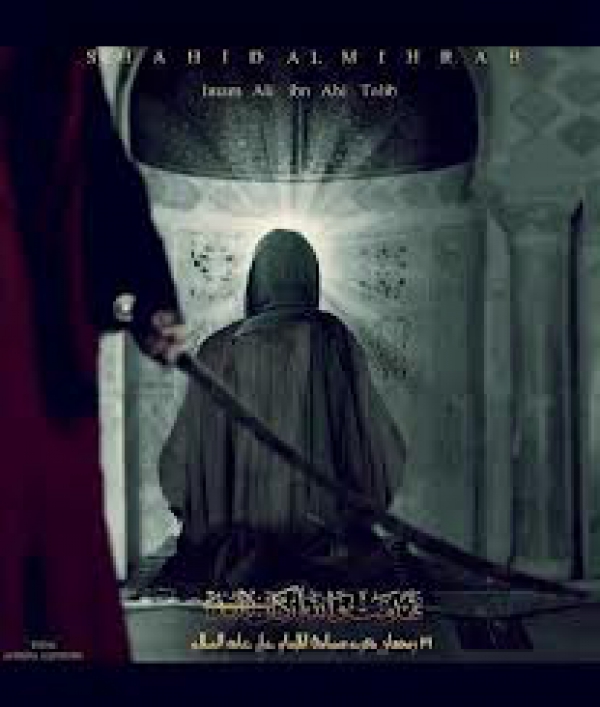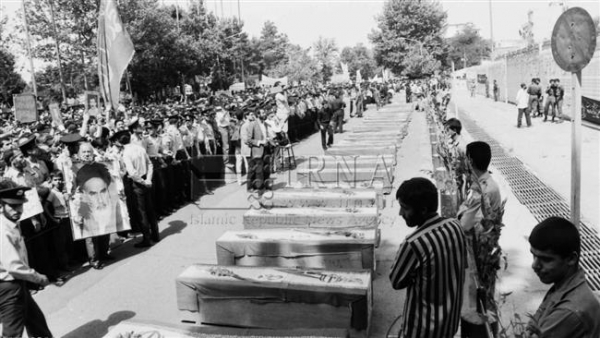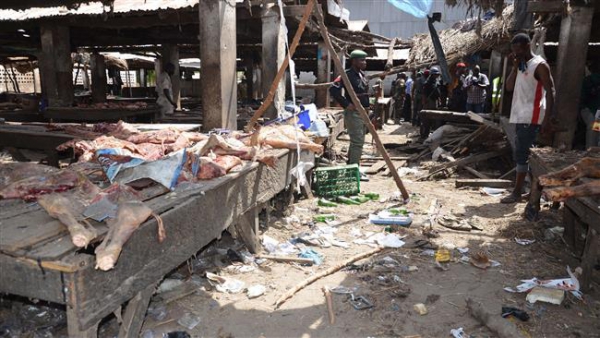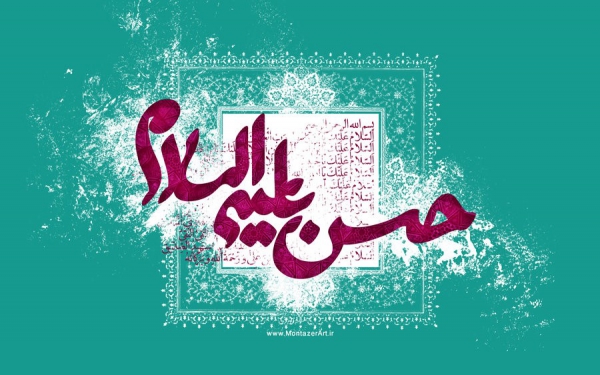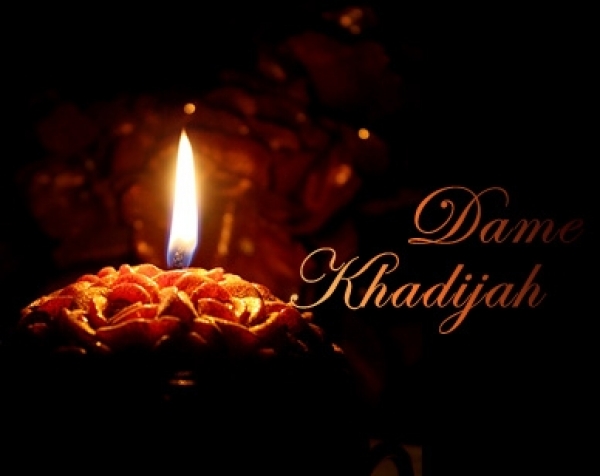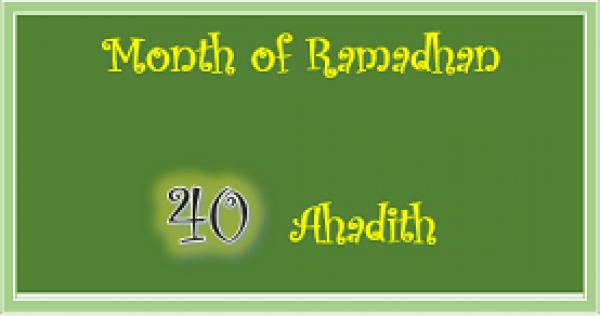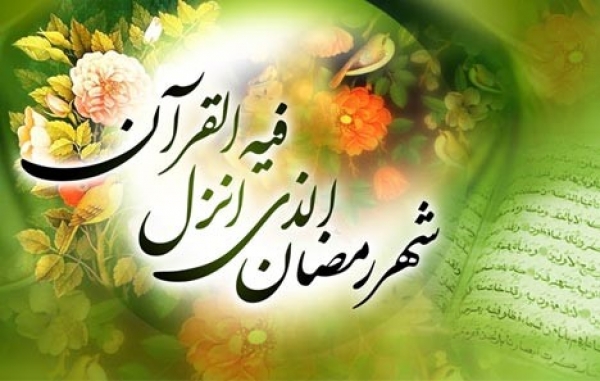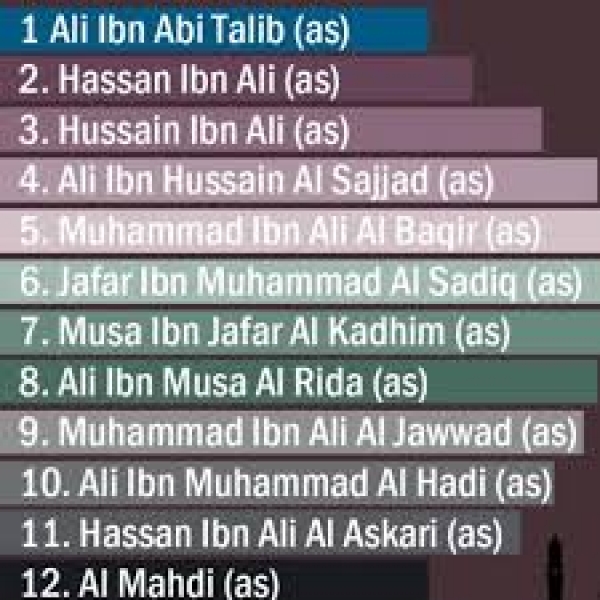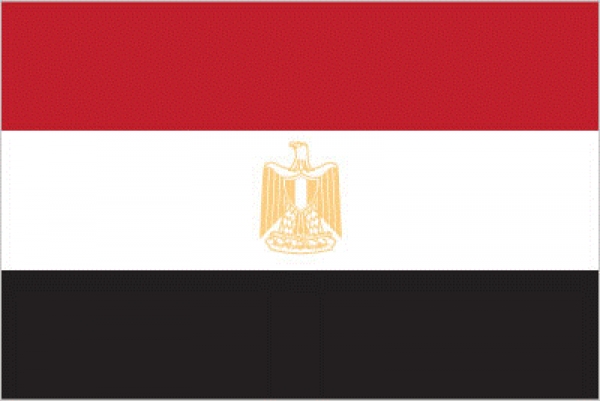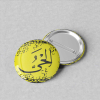hasania
Imam Ali ibn Abu Talib (AS): a victim of poisonous sword while praying
Imam Ali ibn Abu Talib (AS)
On the 13th of the month of Rajab, twenty-three years before the migration of the Prophet Mohammad (pbuh) a child was born in the family of Abu Talib, the light of whom kindled the whole World. Kunaab Mecci narrates about his birth: "We and Abbas (Ibne Abdul Mutalib) were sitting together when suddenly we saw Fatima bint-e-Asad moving towards the Kaabah in the condition having delivery pain and saying "Oh God I have faith in you and the Prophet (i.e., Abraham) who by your command laid the foundation of this house. O God! I swear you by the same Prophet Mohammad (pbuh) and swear you by the child in my womb make this birth comfortable and easy for me."
This was the time when all of us saw with our own eyes that the wall of Kaabah broke apart and Fatima bint-e-Asad entered into the Kaabah. Then the wall again united.
We ran terrified and trembling to our houses to send our women into the Kaabah for the help and assistance of Fatima bint-e-Asad. We did our best but the door did not open. This event surprised all the people of Makkah.
The women of Makkah were anxiously counting moments to meet Fatima bint-e-Asad till the time she came out of the Kaabah along with a beautiful baby, saying, "God has chosen me from among the ladies of Makkah and He made me His guest in His house and gave me meals and fruits of the heaven to eat.
The ladies who were surrounding her in the form of a circle and escorting her to her home asked her, "What name have you given to this child?"
Fatima bint-e-Asad said: "When I was in the Kaabah, I heard a hidden voice call," Name this child "ALI".
Yes! We are talking about Imam Ali ibn Abu Talib (AS) the pious man whose childhood and infancy period lasted in such a pure and chaste way that he himself stated in Nahjul Balagha, "The Prophet Mohammad (pbuh) used to pick me in his lap and embrace me and chew the food and put it into my mouth."
Early youth of Imam Ali ibn Abu Talib (AS):
Ali ibn Abu Talib) AS) describes this enlightening period of his age as under: The Prophet Mohammad (pbuh) used to go to the Cave of Hira but nobody except he (pbuh) and I did know about it. At the time when the religion of Islam had not yet reached the homes, he (pbuh) and his wife Khatijah (SA) were the only Muslims. I was the next person to them who saw the light of revelation and prophet hood and smelled the fragrance of the Prophethood.
When the Prophet Mohammad (pbuh) of Islam was ordered by God to invite his family members to embrace Islam. Imam Ali ibn Abu Talib (AS) according to the advice of the Prophet Mohammad (pbuh) invited forty persons of the Prophet's family at his home. Although the food was quite little but all of them ate fully well. After the meal was over the Prophet Mohammad (pbuh) spoke to those present saying, "Oh the sons of Abdul Mutalib, God has ordered me to invite you to embrace Islam and get you introduced to it."
Whosoever, having believed in my Prophethood, promises to help and assist me shall be my brother, deputy and successor and my caliph.
He (pbuh) repeated this sentence thrice but no one except "Imam Ali ibn Abu Talib (AS)" gave a positive response. As many times as the Prophet Mohammad (pbuh) addressed the persons present, nobody except Imam Ali (AS) answered. Imam Ali ibn Abu Talib (AS) was rising again and again to his feet and promising help to him and announcing his faith.
This is the very reason why the Prophet Mohammad (pbuh) said: "This Ali, is my brother and successor listen and lend ears to what he says and obey his orders." When Imam Ali ibn Abu Talib (AS) entered from his early youth into the phase of puberty, the part of age when all the human energies and powers are strong and firm, even in this part of the life he remained closely associated to the Prophet Mohammad (pbuh) like a flying moth which moves around the Candle. He defended Islam and the Prophet Mohammad (pbuh) with his strong, energetic arms.
When the enemy besieged and surrounded the Muslims in the battle of Hunain and they abandoned and left behind the Prophet Mohammad (pbuh) running away for their lives, it was only and only Imam Ali ibn Abu Talib (AS) who defended and saved the Prophet Mohammad (pbuh) and made the enemies retreat and take to their heels.
Imam Ali ibn Abu Talib (AS) killed Marhab the chief of army of Jews in the Khyber battle, whose power and bravery was making everybody tremble but Imam Ali ibn Abu Talib (AS) cut him into two and pulled apart the gate of the Khyber fort which used to be opened and closed by twenty men together. Imam Ali ibn Abu Talib (AS) used it as a bridge over the trench for the Islamic army to cross over to the Khyber fort. Many such events are the specimens and evidences about the faith, and spirit of self-sacrifice and devotion of Imam Ali ibn Abu Talib (AS).
Self-Sacrifice and Devotion of Imam Ali ibn Abu Talib (AS):
There is no doubt to it that everybody loves his soul and very rarely gets ready to sacrifice it for another person but because of the fact that Imam Ali ibn Abu Talib (AS) loved the soul of the Prophet Mohammad (pbuh) even more than his own one, he got prepared to lay his life for him.
The event takes shape like this. When the polytheists saw that they are in danger, they jointly made a firm determination to take the Prophet Mohammad (pbuh) by surprise and martyr him. So all of them gathered in "Dar un Nadva" and choose one person from each family so that every tribe gets involved in getting Prophet Mohammad (pbuh) killed and then no one could take the revenge of him.
The Prophet Mohammad (pbuh) had come to know about this conspiracy through revelation. God ordered him (pbuh) to migrate from Makkah in the darkness of the night. The Prophet Mohammad (pbuh) needed someone, prepared to sacrifice his life and must be a trustworthy secret holder.
Hence, there was no one else except Imam Ali ibn Abu Talib (AS) in whom he confided, and told him "God has informed me that the infidels will break through the house to kill me so today you sleep on my bed." Imam Ali ibn Abu Talib (AS) smilingly accepted it, because he (as) knew that the life of the Prophet Mohammad (pbuh) would be saved by his action. In fact, Imam Ali ibn Abu Talib (AS) used to say later that the best sleep he had ever had was on that night (Shab-e-Hijrat).
Then the time came when the darkness of the night covered everything and Imam Ali ibn Abu Talib (AS) was sleeping on the Prophet's (pbuh) bed calmly and peacefully and the Prophet Mohammad (pbuh) came out of his house and started proceeding towards the Cave of Saur with Hazrat Abu Bakr (RA). The infidels besieged the house and got prepared with their swords and spears to attack it. The sooner they were instructed to make it, they break through the house rushing with naked swords. But when they found Imam Ali ibn Abu Talib (AS) laying on the bed of the Prophet Mohammad (pbuh) they immediately moved out of the house desperate and astonished, and sent a few horsemen to search the Prophet Mohammad (pbuh). But not very long afterwards they too returned defeated and hopeless.
Allah liked this action of Imam Ali ibn Abu Talib (AS) so much that HE revealed this verse in the Holy Quran: "And among men is he who sells his NAFS (self) in exchange for the pleasure of Allah..." (Surah 2: Baqarah / Verse 207)
Imam Ali ibn Abu Talib (AS) and Holy War:
Islam is the religion of peace and tranquility and does not like killing, plundering, and bloodshed. But if someone kills another without any reason then Islam has strong punishment to deal with him.
Of course, if an enemy attacks the Muslims then by the standards of wits, common sense, and religious law, self -defense which as a form of Jihad/Jehad becomes essential and indispensable.
All the battles of the Prophet Mohammad (pbuh) in which Imam Ali ibn Abu Talib (AS) fought armed and truthfully were defensive battles.
Imam Ali ibn Abu Talib (AS) was such a brave, faithful, holy warrior who never got frustrated and upset and tired of the fighting and battles. He was afraid of no one except God. He used to say "By God if I see that on one side is the truth and on the other side all the rest of the people I, without caring and paying heed to those reproaching me, will fight all alone with my sword, on the way and path of the right, against them.
Martyrdom
On the 19th of Ramadan 40 AH, while praying in the Great Mosque of Kufa, Imam Ali ibn Abu Talib (AS) was attacked by the Kharijite Abd-al-Rahman ibn Muljam. He was wounded by ibn Muljam's poison-coated sword while prostrating in the Fajr prayer. Imam Ali ibn Abu Talib (AS) ordered his sons not to attack the Kharijites, instead stipulating that if he survived, ibn Muljam would be pardoned whereas if he died, ibn Muljam should be given only one equal hit (regardless of whether or not he died from the hit).
Imam Ali () AS) passed away a few days later before dawn on Friday 21th Ramadan 40 A.H. The Imam lingered on for nearly three days in a very poor state. Soon after, he died. His two sons, the Holy Imam s Hasan (AS) and Hussain (AS) washed and shrouded him according to his own bequest. Then they carried him to al-Ghari in Najaf where they buried him quickly. Imam Hasan (AS) fulfilled Qisas and gave equal punishment to ibn Muljam upon Ali's death.
During the four years and nine months of his caliphate, Imam Ali was not able to eliminate the disturbed conditions which were prevalent throughout the Islamic world, but he was successful in many ways. As a result of his just and upright manner of living he revealed once again the beauty and attractiveness if the way if of live of the Holy Prophet and Islam, especially to the younger generation. In contrast to the imperial grandeur and ostentatious habits offered and exhibited so vainly by the likes of Muawiyah and other Umayyad offspring, Imam Ali lived in simplicity and humility, never favoring his friends or relations and family above others, nor preferring wealth to poverty or brute force to weakness. Despite cumbersome and strenuous difficulties which absorbed much of his time he left behind among the Islamic community a valuable treasure of divine sciences and Islamic intellectual discipline. Nearly 11,000 of his proverbs and sayings on different intellectual, religious and social subjects have been recorded. He established Arabic grammar and laid the basis for Arabic literature. He was the first in Islam to delve directly into the questions of metaphysics combining intellectual rigor and logical demonstration. He taught a large number of Islamic servants and religious scholars, among whom are found a number ascetics and Gnostics, who were the forefathers of Sufis. Such men included Uways al-Qarani , Kmail al-Tammar, others among hid disciples became the first teachers of jurisprudence , theology , Quranic commentary and recitation.
Iran slams US for 1988 missile attack on Iranian passenger jet
Iran has decried the 1988 missile attack by the US military on an Iranian passenger jet flying over the Persian Gulf, saying the heinous crime will be etched in memories forever.
The Iranian Foreign Ministry made the comments in a statement issued on Thursday to commemorate the 27th anniversary of the US navy’s shooting down of the Iranian airliner that killed all 290 people on board, including 66 children.
Iran Air Flight 655 was on a routine flight from Iran’s southern city of Bandar Abbas to Dubai when it came under attack by the US navy’s missile cruiser USS Vincennes on July 3, 1988.
The Iranian ministry once again offered sympathy to the bereaved families of the victims, describing the deadly assault by American naval forces as “a blatant violation” of international laws.
At the time of the attack on the Iranian passenger plane, US officials claimed their naval officers had mistaken the Airbus A300 for an Iranian F-14 Tomcat fighter jet, which is at least 10 times smaller than a passenger plane.
In 1990, former US President George W. Bush awarded Captain Will C. Rogers III, the then commanding officer of the USS Vincennes, with the Legion of Merit “for exceptionally meritorious conduct in the performance of outstanding service as commanding officer.”
On June 27, Leader of the Islamic Revolution Ayatollah Seyyed Ali Khamenei slammed the US and its elements for conducting terrorist attacks against Iranians, including the 1988 downing of the Iranian airliner.
“Those who want to cover up the evil enmity of the US and some of its followers through media and propaganda ploys are in fact betraying the nation and state,” the Leader said.
Around 17,000 Iranians have fallen victim to terrorist attacks, many of them carried out by US-backed elements, since the victory of the 1979 Islamic Revolution.
New Boko Haram attacks kill 145 in NE Nigeria: Witnesses
At least 145 people have been killed in fresh attacks by suspected Boko Haram militants on homes and mosques in Nigeria’s restive northeast, witnesses say.
Mohammed Tahir, a local lawmaker, said on Thursday that the militants gunned down 48 Muslim worshippers and injured 11 others during their Wednesday’s assault on two villages located in Nigeria’s volatile Borno State.
The remarks came shortly after witnesses said that almost 100 people died in a similar attack by the militants in the same region.
“The attackers have killed at least 97 people,” Kolo, a local from Kukawa village in Borno State, told AFP on Thursday, adding that he had counted the bodies of the victims.
“They wiped out the immediate family of my uncle...They killed his children, about five of them, and set his entire house ablaze,” Kolo added.
Babami Alhaji Kolo, another witness to the incident, also said that over 50 militants stormed the Nigerian village early Wednesday evening.
“The terrorists first descended on Muslim worshippers in various mosques who were observing the Maghrib (sunset) prayer shortly after breaking their fast,” Alhaji Kolo said, noting that the worshipers were mostly men and young children.
He added that “while some of the terrorists waited and set most of the corpses on fire, others proceeded to houses and shot indiscriminately at women who were preparing food.”
Boko Haram, whose name means “Western education is forbidden,” has claimed responsibility for a number of deadly shooting attacks and bombings in Nigeria since the beginning of their militancy in 2009, which has so far claimed the lives of more than 13,000 people.
Back in February, four nations of the Lake Chad Basin - Chad, Cameroon, Niger and Nigeria - launched a campaign, together with a contingent from Benin, to confront the threat from Boko Haram militants in the region.
Life of Imam Hassan (a.s)
Birth and Childhood of Imam Hassan (a.s.):
In the mid of the month of Ramadan, the 3rd year of Hijrah, a son was born in the small mud house of Hazrat Ali (a.s.). The Prophet Muhammad (saw), on behalf of Almighty God, named him Hassan. Imam Hassan (a.s.) was brought up in the lap of his father Hazrat Ali (a.s.) and mother Fatima Zahra (s.a.) and learnt lessons from the school of his grandfather Prophet Muhammad (saw).
Imam Hassan (a.s.) had a great worth and status in the eyes of the Prophet Muhammad (saw). Sometimes, he (saw) lifted this child upon his shoulder and said, "It is hoped that God will purify this Ummah through him". Or he would say, "Whosoever loves Hassan (a.s.) and Hussain (a.s.) he loves me and whosoever nurses grudge and has enmity against them has enmity with me". "Hassan (a.s.) and Hussain (a.s.) are the two chiefs of the youths of the paradise". Then Prophet Muhammad (saw) said, Hassan (a.s.) and Hussain (a.s.) are the two earrings of the Empyrean, paradise of God takes pride and potentates due to them.
Piety and Purity of Imam Hassan (a.s.):
Imam Hassan (a.s.) was the most pious, devout and ascetic worshiper and adorer of God. Whenever he went to Mecca for pilgrimage, he would go walking on foot. Whenever he performed ablution or stood for his prayers he saw himself in the court of God and his body started trembling he said, "The time has come for me to submit the deposit of God to Him."
When he came to mosque, he would raise his head, in the prayer place, towards the sky and say, "Oh God this is your guest standing in your court. Your defaulter servant has come towards you. And he hopes that you will forgive his bad deeds, by virtue of your kindness and forgiveness."
Awareness and Courtesy of Imam Hassan (a.s.):
One day, an old man was performing ablution. His ablution was futile and invalid. Imam Hassan (a.s.) ought to make him aware of his fault but how? If he said to him you are wrong possibly his heart might break and he got annoyed and did not accept it. He along with Imam Hussain (a.s.) decided to create a scene and ask the old man to make the judgment. Imam Hassan (a.s.) addressed Imam Hussain (a.s.) and said, "I perform a better ablution as compared to yours." Imam Hussain (a.s.) said "I perform it better than you do." Both of them approached the old man and said, "You come and see our ablution and decide who performs a better ablution." Both of them got busy with performing ablution and ended it in a correct and nice way. The old man understood what the secret of their act was and became aware that they meant him to find out his fault, in this way. So he said to them "The ablution performed by both of you is correct, I am an old man, who did not know how to perform the ablution correctly. You made me aware about my fault. I am much thankful to you."
The Charity and mercifulness of Imam Hassan (a.s.):
1. A person came to Imam Hassan (a.s.) and said "poverty and bad luck is torturing me. You are a family of chastity, purity and infallibility. Get me saved from this cruel enemy?" Hazrat Imam Hassan (a.s.) called his servant and said, "How much money do you have available?" He replied "five thousand Dinnars" He said, "Give all of this money to this man so that it may become the capital of his business and life and he may relieve himself off and get rid of poverty and resource less ness.
2. One day, Imam Hassan (a.s.) went to the house of God. In the very condition when he was busy praying he heard a man addressing his God and saying, "Oh God, I need ten thousand Dirhams to get it shaped as the capital of my life and you the merciful one give me this boon and blessing". The moment Imam Hassan (a.s.) returned back, he sent the said amount for him.
3. A poor and distressed man came to Imam Hassan (a.s.) and recited a rhyme meaning thereby, "I am left over with nothing, not even a single dirham. You can perceive my condition fully well and know it. I have nothing left with me to sell except my honor. I know you are the purchaser and buyer of it." The Imam Hassan (a.s.) at once called his servant and said, "Whatever money you have got with you, give it to this man."
The servant gave ten thousand Dirhams to him. Hazrat Imam Hassan (a.s.) asked the servant to make excuse as well, because, he did not possess more than that amount to be given out to him. He advised him to take that money and use it for his life and running the wheels of it and possibly getting rid of poverty and distress.
These few stories exhibit this fact that in the same way Imam Hassan (a.s.) was thoughtful and consider ant about the dooms day of the people, he was careful and considering about their Worldly affairs, for, the World is connected and patched up with the justice day. And the hunger and poverty stricken man cannot think about his dooms day. We must fully know that the Imam's helps and aids to the people as were not of the sort to encourage people about begging. Instead, these were extended in a manner to extend job and activity chances for them.
Imam Hassan's (a.s.) Caliphate:
On the 21st night of the Ramadan of 40th Hijra his father Hazrat Ali ibn-e-Abi Talib (a.s.) passed away making all the people sorrowful and grieved. Imam Hassan (a.s.) who was 27 years of age came along with the people to the mosque and climbed the tribune and said, "Last night, a man, who was unique in knowledge piety, conduct and character among the previous ages people as well those to come in future, has gone out of you. He participated the battles along with the Prophet Muhammad (saw) and strived hard to guard Islam. A person who was the thorn of the eyes of the enemies and the fruit of the heart of friends. And he did not spare and accumulate anything from the wealth of the world for himself, except for seven hundred Dirhams by which he wanted to provide a servant for his family."
At this moment, the Imam (a.s.) wept bitterly and the people too wept. Then he spoke about himself. So that the people may know that the Imamate has been handed over to him and that people might not go astray and did not get misled. He said, "I am the son of the Prophet Muhammad (saw), Ali (a.s.) and Fatima (s.a.). I am the flame of the lighted lamp of Prophet hood. The families from which God has driven the dirt, contamination and pollution away.
Then Abdullah Ibn-e-Abbas stood up and said "Oh people this is the son of the Prophet Muhammad (saw) and your Imam, beware, that he is the right heir and successor of Hazrat Ali (a.s.). So take the oath of allegiance and loyalty for him".
People moved in shape of groups towards Imam Hassan (a.s.) and took the oath of allegiance for him. Imam Hassan (a.s.) made it a condition that they would fight anyone against whom he fought and whenever he deemed it fit to make peace, they would also accept it. All of them accepted it, and willingly agreed and submitted to his Imamate.
The Conspiracies of Muawiyah:
Muawiyah had established a government and dominion in Syria and for years he had played tricks with cunning ways and means against Hazrat Ali (a.s.). He killed the friends of Hazrat Ali (a.s.) and brought into existence the perverted group and sect of Khwaraj Now, when he heard that people, after the martyrdom of Hazrat Ali (a.s.), took oath of allegiance to elect Imam Hassan (a.s.) for the caliphate post as the successor of the Prophet Muhammad (saw). This thing was very hard for him to tolerate. He sent spies to Kufa and Basra to find out and get him informed about what was going on. And thereafter, they may plot and hatch conspiracies against Imam (a.s.) if they deem fit and suitable they might start subversion and sabotage and create chaos, and disorder.
Imam Hassan (a.s.) gave the order that the spies should be arrested and killed. Then he wrote a letter to Muawiyah and he replied too then war begins.in this situation many people did not obey Imam Hassan (a.s). Muawiyah deceived the army commanders of Imam Hassan by giving them money and making false promises.
Imam Hassan's (a.s.) Grief:
When the news of the joining of tribal chiefs with Muawiyah reached the Imam Hassan (a.s.). He was much affected and shocked and said, "Did I not say several times that you do not have any faithfulness and trustworthiness, and your conduct with me is that of artifice, and cunningness? He then decided to gather an army himself and move. By the efforts of his friends nearly four thousand men gathered. Imam (a.s.) along with "Sabaat" went to Madayan and sent twelve thousand men under the command of Obaidullah bin Abbas and his helper Qais bin Saad, as a file leader and fore runner to meet and resist Muawiyah, so as to test their spirit and strength of devotedness. Muawiyah sent his agents along with one million Dirhams among the forces of Imam Hassan (a.s.) to get Qais deceived but Qais did not yield to his desire and answered them, "tell Muawiyah you cannot take my faith from me and I will not desert and leave Imam by any of your artifices and frauds."
The agents who got disappointed by Qais and went towards the real Commander Obaidullah bin Abbas and lured and deceived him and he along with a group of his followers joined Muawiyah at the nighttime. When the army men of Imam Hassan (a.s.) became commander less, Qais took over the Command and lead the Jamaat prayers. Qais was fighting fiercely and ferociously and had made Muawiyah harassed and fearful. As a result, he sent a few spies among the army men of Qais, so that they may make this propaganda that Imam Hassan (a.s.) has entered into peace treaty with Muawiyah and you are fighting for no reason. By this way Muawiyah succeeded in separating and detaching the group of Khawarij from the Imam's forces and in deceiving them to attack the Imam Hassan (a.s.) and what he desired did materialize.
Why Imam Hassan (a.s.) accepted the Truce?
The adventurer Khawarij and the dishonest friends of Imam Hassan (a.s.) made it inevitable for the Imam Hassan (a.s.) to accept truce with Muawiyah. But truce did not mean that Imam Hassan (a.s.) colluded and put up with Muawiyah and agreed to his cruel and brutal activities. But it meant to make a no war pact with Muawiyah for a certain period. Because, if Muawiyah became victorious he would had smashed and destroyed all the hopes of Islam and would have destroyed the foundation of Islam and killed all the true Muslims. Besides, the Roman Empire was seeking a chance to attack the Islamic lands, and this mutual difference of Muslims was the best opportunity for it. Then, he sent his cousin Abdullah Bin Harris to see Muawiyah so that he should get him committed upon the conditions, which he had presented after a negotiation with him, and write down the agreement, and treaty of truce.
A part of the truce treaty is as under: -
1. The blood of the Shias must remain respect worthy and their rights must not be confiscated and crushed.
2. Filthy language must not be used against Hazrat Ali (a.s.) and his Shias.
3. Muawiyah should practice upon the Book of God (The Quran) and the Sunnah of Holy Prophet Muhammad (saw).
4. The friends and companions of Imam Hassan (a.s.) must remain safe and secure from his mischief's and brutalities wherever they live and no one has the right to resist them.
5. Imam Hassan (a.s.) does not call Muawiyah, Ameerul Momineen and will not take his name in the Khutbas (sermons).
6. Muawiyah must not hand over the caliphate to anybody after himself.
The Breaking of the Pact:
After the peace pact was conducted, Muawiyah focused his attention upon Kufa and held the Juma prayer congregation at Nakheela. He evidently and clearly said in his Jumma speech "Oh people I did not fight against you so that you should offer your prayers and keep fast, instead, it was for the reason that I rule over you although you do not like it. I will crush all the conditions of truce pact conducted with Hassan bin Ali (a.s.) under my feet. But the conduct of Muawiyah in certain matters showed that he was strongly embarrassed and harassed due to the influence of Imam Hassan (a.s.) so that sometimes he was obliged to put into practice few of the points of the peace pact.
So that once when Ibn-e-Ziad the governor of Kufa followed and chased (to punish) one of the friends of Imam (a.s.), Imam Hassan (a.s.) wrote about the incident to Muawiyah, who at once reprimanded Ibn-e-Ziad about this event.
Finally Muawiyah Decided to make Yazeed his successor:
But the pact, which he had signed with Imam Hassan (a.s.), stopped him from this act. He decided to poison the Imam Hassan (a.s.) so that the way to the succession of his son Yazeed should become open and clear. And then make the people forcibly take oath of allegiance (for Yazeed's). Therefore, he contacted "Jodah bint Asash" the wife of Imam Hassan (a.s.) and deceived by luring her and sent a poison for her, with the message that if you make your husband take this poison you will get a prize of one hundred thousand Dirhams from me. Besides, I will select you as the wife of Yazeed and you will become the wife of the caliph of Muslims.
The dishonest hand poisoned the Imam's Utensil (food):
The womanly scruples regarding the money and fame blinded the eyes of the wife of Imam Hassan (a.s.) and made her accept the suggestion of the cunning fox and commit such a dishonesty which history will never forget. Although Imam Hassan (a.s.) had said several times that I will get martyred by my wife. And people had requested him that if it is so then divorce her and turn her out of your house. But Imam Hassan (a.s.) replied, "She has not yet committed any crime and if I turn her out of the house, I would not have done a right thing. Because, she will make this step an excuse and will say, Imam has turned me out of his house without any fault. So that by this means she may cover her crime up and show her work as correct. Beware; Muawiyah will not let me go. If I leave my wife, even then she will not abandon her dishonesty except this that she will carry her program forward under the cover of her being oppressed.
Finally on the 28th day of Safar, 50th Hijrah when the weather was extremely hot and the Imam Hassan (a.s.) was fasting, Jodah bint Asash, poisoned his milk pot and presented to him for breaking the fast.
Imam Hassan (a.s.) drank a portion of the poisonous milk and then addressed her, "Oh the enemy of God and Prophet Muhammad (saw) you have killed me. God kill you. By God, you and Muawiyah both will become abject, despised and helpless." And the same happened as he had foretold, and predicted. Jodah bint Asash was turned out of Muawiyah's court with humility and not very long had passed that she died. And Muawiyah too died of a terrible life taking pain.
Imam Hassan (a.s.) passed away having faced pain and discomfort. And was buried in the graveyard of Baqi in Medina. God and Prophet's blessings be upon his pure soul.
Du'a al-Iftitah
Iftitah was taught by the twelfth Imam (as), Muhammad al-Mahdi to recite every night during the Holy month of Ramadan.The prayer is excellent for molding man’s attitude towards his Creator as it discusses many aspects of the human being and the Grace of God.The prayer can be divided into two parts:
1) Man’s relationship with God.
2) Divine leaders.
we recite this beautiful du'a during the nights of Ramadhan.
Du'a al-Iftitah
In the name of Allah, the Beneficent, the Merciful.
O Allah send Your blessings on Muhammad and the family of Muhammad.
O Allah, I begin glorifying You with Your Praise
You direct towards what is right through Your Grace
I am convinced that You are the most Merciful in matters of forgiveness and mercy
but most severe in matters of warning and retribution
and the most mighty in matters of power and magnificence.
O Allah You have allowed me to supplicate to You and ask from You
Then hear my praise O One who hears all
and answer my call O Merciful
and decrease my mistakes O most Forgiving
How often, O my God, You have relieved me of troubles
how many griefs You have dispelled
how many mistakes You have prevented
how many blessings You have spread
and how many series of afflictions You have separated
All Praise is for Allah who has not taken a wife nor a son
who has no partner in His Kingdom
who has no friend to protect Him from humiliation
so magnify Him with a great Magnificnace
بسم الله الرحمن الرحيم
اللهم صلي على محمد وأل محمد
اللهم إني افتتح الثناء بحمدك
وأنت مُسدد للصواب بمنك
وأيقنت أنك أنت ارحم الراحمين في موضع العفو والرحمة
واشد المُعاقبين في موضع النكال والنقمة
واعظم المُتجبرين في موضع الكبرياء والعظمة
اللهم اذنت لي في دُعائك ومسئلتك
فاسمع يا سميع مدحتي واجب يا رحيم دعوتي
واقل يا غفور عثرتي
فكم يا الهي من كُربة قد فرجتها وهمُوم قد كشفتها
وعثرة قد اقلتها ورحمة قد نشرتها
وحلقة بلاء قد فككتها
الحمد لله الذي لم يتخذ صاحبة ولا ولداً
ولم يكن له شريك في الملك
ولم يكن له وليّ من الذل وكبره تكبيراً
All Praise is for Allah for all His praiseworthy acts
for all His favours and blessings
All Praise is for Allah who has no opposition in His Kingdom
nor any challenge to His command
All Praise is for Allah who has no partner in creation
nor anyone like Him in His Greatness
All Praise is for Allah, His commands operate over His creation
His Praise is evident through His Generosity
whose bestowal stretches out liberally
His treasures never decrease
(rather) the frequency of His Giving increases
His Generosity and Kindness,
Surely He is the Mighty, the Bestower.
O Allah I ask You a little from much
although I am in great need of it
while You are eternally needless of it
though it is a lot for me
while it is easy and simple for You.
الحمد لله بجميع محامده كُلها
على جميع نعمه كله
الحمد لله لا مُضاد في مُلكه
ولا منازع له في أمره
الحمد لله الذي لا شريك له في خلقه
ولا شبيه له في عظمته
الحمد لله الفاشي في الخلق امرُهُ
وحمده الظاهر بالكرم مجدُه
الباسط بالجُود يده
الذي لا تنقُص خزائنه
ولا تزيده كثرة العطاء إلا جُوداً وكرما
إنه هو العزيز الوهاب
اللهم إني أسئلك قليلا من كثير
مع حاجة بي إليه عظيمة
وغناك عنه قديم
وهو عندي كثير وهو عليك سهل يسير
O Allah, indeed Your forgiveness of my sins
and Your overlooking my faults
Your pardoning my oppression
Your hiding my ugly deeds
and Your forbearing my many wrongs
done intentionally or unintentionally
tempted me to ask from You
what I did not deserve from You
which You (still) gave me out of Your Mercy
provided me by Your Power
and made known to me from Your answers.
So I became habituated to call You trustingly
and ask You familiarly
neither fearing nor scared
but with confidence in You for what I intended
Then if there was a delay (in Your answer)
I would blame You, due to my ignorance
and perhaps the delay was best for me
for You know the outcome of all affairs.
I have not seen a more generous master
patient with a wretched slave than You are with me
My Lord, You call me and I turn away from You
You show affection to me and I show hatred towards You
You display Your love for me and I do not respond
as though I am above You
But this does not prevent You from having mercy on me
being good to me
and favouring me, through Your Generosity and Nobility
so please (continue to) have mercy on your ignorant slave
and be kind to him through the excellence of Your Grace
اللهم إن عفوك عن ذنبي وتجاوزك عن خطيئتي
وصفحك عن ظُلمي وسترك على قبيح عملي
وحلمك عن كثير جرمي
عند ما كان من خطاي وعمدي
اطمعني في ان اسئلك ما لا استوجبه منك
الذي رزقتني من رحمتك
واريتني من قدرتك وعرفتني من اجابتك
فصرت ادعوك امنا واسئلك مُستانسا
لا خائفا ولا وجلا
مُدلا عليك فيما قصدت فيه اليك
فإن ابطأ عني عتبت بجهلي عليك ولعل الذي
ابطأ عني هو خير لي لعلمك بعاقبة الأمور
فلم ار مولىً كريما اصبر على عبد لئيم منك عليّ
يا ربي إنك تدعوني فأولي عنك
وتتحبب إليّ واتبغض إليك
وتتودد إليّ فلا اقبل منك كأن لي التطوُّل عليك
فلم يمنعك ذالك من الرحمة لي والإحسان إليّ
والتفضل عليّ بجودك وكرمك
فارحم عبدك الجاهل وجُد عليه بفضل احسانك
Surely You are the Bountiful, the Generous.
All Praise is for Allah
The Owner of the Kingdom
who makes the ships sail,
controls the wind,
causes the dawn to break,
is the authority on the Day of Judgement,
the Lord of the worlds.
All Praise is for Allah
for His patience despite His knowledge.
All Praise is for Allah
for His forgiveness despite His power.
All Praise is for Allah
for the lengthy respite He gives despite His anger,
though He has the power to do as He wills.
All Praise is for Allah
the creator of all creation,
the provider of plentiful sustenance,
the cleaver of the dawn,
possessor of Glory and Honor,
and Excellence and Blessings,
who is far and thus cannot be seen,
but is close and thus witnesses secret conversations,
Blessed and Exalted be His name.
All Praise is for Allah
who has no equal who argues with Him
nor anyone similar to Him
nor any Helper to support Him
He overpowers the mighty by His strength
the great humble themselves before His tremendousness,
He accomplishes what He wishes through His power
إنك جواد كريم
الحمد لله مالك المُلك مُجري الفلك
مُسخر الرياح فالق الأصباح
ديّان الدين رب العالمين
الحمد لله على حلمه بعد علمه
والحمد لله على عفوه بعد قدرته
والحمد لله على طول اناته في غضبه
وهو قادر على ما يُريد
الحمد لله خالق الخلق
باسط الرزق فالق الإصباح
ذي الجلال والإكرام والفضل والإنعام
الذي بعد فلا يُرى وقرب فشهد النجوى
تبارك وتعالى
الحمد لله الذي ليس له مُناز يُعادله
ولا شبيه يُشاكله ولا ظهير يُعاضده
قهر بعزته الأعزاء وتواضع لعظمته العُظماء
فبلغ بقدرته ما يشاء
All Praise is for Allah
who answers me when I call Him
covers all my faults yet I disobey Him
increases His bounties on me
but I do not acknowledge them.
How many pleasant gifts He has given me
how many great fears He has removed
how many delightful joys He has shown me
Thus I glorify Him, thanking Him
and I remember Him with praise.
All praise is for Allah
whose curtains cannot be opened
whose doors cannot be locked
who does reject the one who asks Him
and who does not disappoint the one who places hope in Him.
All Praise is for Allah
who provides safety for the frightened
rescues the virtuous
raises the oppressed
humiliates the proud
destroys kings
and replaces them with others.
All Praise is for Allah, who crushes the tyrants
annihilates the oppressors
watches over the runaways
punishes the oppressors
assists those who cry for help
grants the requests of the beseechers
and is the confidence of the believers.
الحمد لله الذي يُجيبني حين اناديه
ويستر عليّ كل عورة وأنا اعصيه
ويُعظم النعمة عليّ فلا اجازيه
فكم من موهبة هنيئة قد اعطاني
وعظيمة مخوفة قد كفاني وبهجة مونقة قد اراني
فاثني عليه حامداً واذكُره مُسبحا
الحمد لله الذي لا يُهتك حجابه ولا يُغلق بابه
ولا يُرد سائله ولا يُخيّب امله
الحمد لله الذي يُؤمن الخائفين
ويُنجي الصالحين ويرفع المُستضعفين
ويضع المُستكبرين ويُهلك ملوكا
ويستخلف أخرين
والحمد لله قاصم الجبارين
مبير الظالمين مُدرك الهاربين
نكال الظالمين صريخ المستصرخين
موضع حاجات الطالبين معتمد المؤمنين
All praise is for Allah
in whose awe the skies and its inhabitants shake
the earth and its inhabitants tremble
the sea and all that swims in it, billows
All praise is for Allah who guided us to this
and we would not have been guided
had He not guided us to this.
All Praise is for Allah
who creates but is not created
gives sustenance but is not given sustenance
feeds but is not fed
causes the living to die and gives life to the dead
He is Ever-living and does not die
in His control is all good
and He has power over all things.
O Allah send Your Blessings on Muhammad
Your servant, Your Messenger
Your trustee, Your chosen One, Your beloved
the best of Your creation
the preserver of Your secrets
and the preacher of Your messages.
prosperous, pleasant, holy and sublime
more than what You have blessed
given, had mercy, sympathized and greeted
anyone from Your servants
Your Prophets, Your Messengers
Your chosen ones
and the honorable ones from Your creation.
الحمد لله الذي من خشيته ترعد السماء وسُكانها
وترجف الأرض وعُمارها
وتموج البحار ومن يسبح في غمراتها
الحمد لله الذي هدانا لهذا
وما كُنا لنهتدي لو لا أن هدانا الله
الحمد لله الذي يخلق ولم يُخلق
ويرزُق ولا يُرزق ويُطعِم ولا يُطعم
ويُميت الأحياء ويُحيي الموتى
وهو حيّ لا يمُوت بيده الخير
وهو على كل شيئ قدير
اللهم صلي على محمد عبدك ورسولك
وأمينك وصفيّك وحبيبك
وخيرتك من خلقك وحافظ سرك ومبلغ رسالتك
افضل واحسن واجمل واكمل وازكى
وانمى واطيب واطهر واسنى
واكثر ما صليت وباركت وترحمت
وتحننت وسلمت على احد من عبادك وانبيائك
ورسلك وصفوتك واهل الكرامة عليك من خلقك
O Allah, and send Your blessings on ‘Ali
the commander of the faithful
and the successor of the Messenger of the Lord of the worlds.
Your servant, Your friend
the brother of Your Messenger
Your proof over creation
Your great sign
and the mighty awaited news.
And send blessings on the truthful, pure (lady)
Fatima az-Zahra
the leader of the women of the worlds.
And send Your blessings on the two grandsons of mercy
(to the world, i.e. the Prophet),the leaders of guidance
Al-Hasan and Al-Husayn
the leaders of the youths of Paradise.
And send blessings on the leaders of Muslims
‘Ali son of Husayn
Muhammad son of ‘Ali
Ja’far son of Muhammad
Musa son of Ja’far
‘Ali son of Musa
Muhammad son of ‘Ali
‘Ali son of Muhammad
Hasan son of ‘Ali
and the successor, the guide and the rightly guided
(these are) Your proofs over Your servants
Your trustees on Your land
(bless them with) numerous and continous blessings
اللهم صلي على عليّ أمير المؤمنين
ووصيّ رسول رب العالمين
عبدك ووليّك واخلي رسولك وحُجتك على خلقك
وايتك الكبرى والنبأ العظيم
وصلي على الصديقة الطاهرة
فاطمة الزهراء سيدة نساء العالمين
وصلي على سبطى الرحمة واماماي الهُدى
الحسن والحُسين سيدي شباب اهل الجنة
وصلي على أئمة المسلمين ، عليّ بن الحسين
ومحمد بن عليّ
وجعفر بن محمد
وموسى بن جعفر
وعليّ بن موسى
ومحمد بن عليّ
وعليّ بن محمد
والحسن بن عليّ
والخلف الهادي المهدي
حُجتك على عبادك وأمنائك في بلادك
صلوة كثيرة دائمة
O Allah and send blessings on the guardian of Your orders
the one who will rise
the one hoped for, the awaited justice.
Surround him with Your favourite angels
and assist him with the holy spirit
O Lord of the worlds.
O Allah, appoint him to invite towards Your book
to establish Your religion
make him the successor on the earth
as You caused others to succeed before him
establish for him his religion which You have approved for him
give him security after fear
(so) he worships You and does not associate any with You.
O Allah, give him power and through him strengthen (others)
help him and help (others) through him
help him with a mighty help
give him an easy victory
and grant him an assisting authority from You.
O Allah, make manifest through him Your religion
and the way of Your Prophet
until nothing from the truth remains hidden
from any human being.
O Allah, we earnestly desire from You
an honored state
through which You strengthen Islam and its people
and degrade hypocrisy and its followers.
And make us in it
amongst the inviters towards Your obedience
and the leaders to Your path
give us through it
honor of the world and the Hereafter.
اللهم وصلي على وليّ امرك القائم المؤمل
والعدل المنتظر وحُفه بملائكتك المقربين
وأيده بروح القدس يا رب العالمين
اللهم اجعله الداعي إلى كتابك والقائم بدينك
استخلفه في الأرض كما استخلفت الذين من قبله
مكِن له دينه الذي ارتضيته
ابدله من بعد خوفه امناً يعبدك لا يُشرك بك شيئاً
اللهم اعزه واعزز به وانصره وانتصر به
وانصره نصراً وافتح له فتحاً يسيراً
واجعل له من لدنك سلطاناً نصيراً
اللهم اظهر به دينك وسُنة نبيّك
حتى لا يستخفى بشي من الحق مخافة احد من الخلق
اللهم إنا نرغب إليك في دولة كريمة
تُعز بها الإسلام واهله وتُذل بها النفاق واهله
وتجعلنا فيها من الدعاة إلى طاعتك
والقادة إلى سبيلك
وترزقنا بها كرامة الدنيا والأخرة
O Allah, what You have made known to us of the truth
help us bear it
and what we fall short
make us reach it.
O Allah, through him
put order in our affairs
gather and unite our flocks
join together our separations
increase our minority
lift us from degradation
relieve our miseries
pull us out of our debts
remove our poverty
fill the gaps in our confusion
ease our difficulties
brighten our faces
free our prisoners
grant our requests
fulfil our promises
answer our calls
grant us our requests
cause us to obtain what we hope for
from this world and the hereafter
and give us more than our expectations.
O the best of all who are asked
and the most generous of bestowers
through him, cleanse our chests
remove the stains of anger and hatred from our hearts
and guide us to the truth on disputed matters
By Your permission
Surely You guide whom You wish to the right path
through him help us to overcome Your enemy
and our enemy
O God of truth, Ameen.
اللهم ما عرفتنا من الحق فحملناه
وما قصرنا عنه فبلغناه
اللهم اللمم به شعثنا واشعب به صدعنا
وارتُق به فتقنا وكثر به قلتنا
واعزز به ذلتنا واغن به عائلنا
واقض به عن مغرمنا واجبر به فقرنا
وسُد به خلتنا ويسّر به عُسرنا
وبيض به وجوهنا وفُك به اسرنا
وانجح به طلبتنا وانجز به مواعيدنا
واستجب به دعوتنا واعطنا به سؤلنا
وبلغنا به من الدنيا والأخرة امالنا
واعطنا به فوق رغبتنا
يا خير المسؤولين واوسع المُعطين
اشف به صُدورنا واذهب به غيظ قلوبنا
واهدنا به لِما اختلف فيه من الحق
بإذنك إنك تهدي من تشاء إلى صراط مستقيم
وانصرنا به على عدوك وعدونا
إله الحق أمين
O Allah, we complain to You
of the absence of our Prophet
Your blessings be on him and his family,
the concealment of our leader
the abundance of our enemies
the scarcity of our numbers
the severity of our trials
and the victory of the era against us.
So bless Muhammad and his family
and help us overcome that by,
granting us an immediate victory
dispersing miseries
giving us a help that strengthens
providing an authority of truth which You manifest
a mercy from You which is clear to us
and a wellbeing from You which clothes us
by Your mercy O most merciful.
اللهم إنا نشكوا إليك فقد نبيّنا صلواتك عليه وأله
وغيبة وليّنا وكثرة عدوّنا
وقلة عددنا وشدة الفِتن بنا
وتظاهر الزمان علينا
فصل على محمد وأله
واعنا على ذلك بفتح منك تُعجله
وبضُر تكشفه ونصر تُعزه وسُلطان حق تُظهره
ورحمة منك تُجللناها وعافية منك تُلبسناها
برحمتك يا ارحم الراحمين
Hazrat Khadija (SA) Demise
Hazrat Khadija (SA) daughter of Khuylaid and Fatima was born in Mecca in 555 CE and was a pious and worthy lady, who at the time of the pagan regime of the Arabs before Islam was well-known as "Tahireh" (Pure and Chaste Woman). She was well-known as a great and distinguished wealthy lady in the Arabian Peninsula. She engaged herself in business by the assistance of others, who traded in partnership on her behalf. Therefore, she was looking for a trustworthy and honest man on whom she could rely completely with her capital for business.
When Hazrat Khadija (SA) became interested in Prophet Muhammad (SAW), he was 25-years-old and already quite well-known for his integrity and honesty besides his outstanding quality as an exceptionally trustworthy man. Hence she made a proposal to him through his uncle Abu Talib. In her proposal she offered him the management of her business.
Hazrat Khadija (SA) was well-aware of the glad tidings of the eminent coming of the Seal of the Prophets (SAW) through learned-men and spiritual leaders among them her uncle Varaqat ibn Nofal, who was considered as a prominent Arab scientist. Later her interest changed to enthusiasm upon learning that the awaited Prophet would arise to his Prophetic Mission from the City of Mecca and would marry a noble and wealthy lady of Quraysh. Her eagerness to learn more about him was heightened when Varaqat ibn Nofal gave her the good tidings that she was the chosen woman to have the honor of marriage to the Holy Prophet (SAW).
Hazrat Khadija (SA) encouraged by the positive response of Muhammad (SAW) to her offer in accepting the responsibility to lead her business caravan, appointed Moyaser, her slave as agent to
observe Muhammad's (SAW) manner and conduct during the journey and to report his observations to her. When the caravan returned from Damascus to Mecca, Khadija (SA) went to an upper-room, to be in a position to watch over the goods and their supervision. Then a stunning event held her attention and filled her with a deep sense of faith, she noticed that a cloud shaded Muhammad (SAW) and followed his steps and moved in accordance with his movements. Her interest became so intense that she proposed to him and said: "In case you desire to engage in marriage, I am ready and willing to be your wife and slave." The news of this proposal reached Abu Talib and the rest of the uncles. Abu Talib in an eloquent fashion executed the marriage contract, while Khadija's (SA) dowry came from her own wealth.
As soon as the formal proposition ceremonies and marriage were performed, the lower-class and ignorant women of Mecca who knew Khadija's (SA) wealth and prominent suitors for marriage, criticized her harshly for accepting and marrying Muhammad (SAW), who was an orphan of Abdullah, indigent of Banu Hashim and who was not of her standing.
Khadijah married the Holy Prophet of Islam, Hazrat Muhammad (PBUH) when she was 40 and he was 25 in 595 CE. They had six children: two sons and four daughters.
"When none believed me, Khadijah did. She made me a partner in her wealth." Those are the words of our Prophet Muhammad (PBUH) about his wife.
Khadijah lived with the prophet for 25 years and was his only wife during that time. When the revelations came from Allah and Muhammad (PBUH) was made the last prophet in 610 CE, it was Khadijah who accepted the faith and became the first Muslim. She was 55 years old at that time. Her acceptance of Islam greatly helped the spread of the religion among the Mecca residents.
She stood by the prophet all the time. In moments of trial and difficulty, the prophet used to come to her and she consoled and comforted her husband and encouraged him. Khadijah's wealth was used for the cause of Islam.
The prophet and Khadijah had to bear the death of their sons Qasim and Abdullah in their infancy and in the fifth year of prophethood, their daughter Ruqaiyyah left them and migrated to Abyssinia (Ethiopia) with her husband.
The Quraysh did all they could to stop Muhammad's (PBUH) propagation of Islam. Hazrat Khadijah was his source of encouragement and comfort. She also had to bear enormous strain and suffering during the boycott at Sha'bi (the valley of) Abu Talib for three years.
The great Muslim lady passed away on Ramadan 10th in the tenth year of Hijrah (prophethood), 620 CE, at the age of 65. Her death was a great loss to the prophet. He loved Khadijah so dearly that after her death, he used to remember her often.
Forty Hadith (Ahadith) Regarding the Month of Ramadan
Forty Hadith (Ahadith) Regarding the Month of Ramadan
Introduction:
Holy Prophet Muhammad (peace be upon him and his progeny) has said: "Those people from amongst my ummah, who memorize forty hadith (traditions) pertaining to those issues of religion, which they are in need of, Allah shall resurrect them on the Day of Judgment as jurisprudents and scholars." (Bihar al-Anwar, vol. 2, pg. 156; Al-Ikhtasaas, pg.2)
Hadith No. 01
Why the name 'Ramadan'?
Holy Prophet Muhammad (peace be upon him and his progeny) said: "Surely, the month of Ramadan has been named so because it scorches away the sins." Kanz al-Ummal, H: 23688
Hadith No. 02
Ramadan: The Name of God
Imam Sadiq (A.S.) has said: Say not, "This is Ramadan" and "Ramadan has departed" and "Ramadan has arrived" for surely, Ramadan is one of the names of Allah, The Mighty, the Glorious, who neither arrives nor departs. Surely, arrives and departs that, which is ephemeral, Instead say: "The month of Ramadan". Al-Kafi, 4, pg. 70
Hadith No. 03
Ramadan: The Month of Revelation of the Holy Quran
Imam Reza (A.S.) has said: If one asks, "Why is it that the fasts were made obligatory exclusively in the month of Ramadan and not in the other months?" it would be said, "(this is) because the month of Ramadan is the month in which Allah, the Exalted, had revealed the Holy Quran." Bihar al-Anwar, vol. 18, pg. 190
Hadith No. 04
Reward for Recitation of the Holy Quran during Ramadan
Imam Reza (A.S.) has said: "Someone who recites one verse from the Book of Allah, The Mighty, The Glorious, in the month of Ramadan, is like one who has recited the entire Holy Quran in the other months." Bihar al-Anwar, vol. 93, pg. 344
Hadith No. 05
Reward of the Month of Ramadan
Holy Prophet Muhammad (peace be upon him and his progeny) was asked: O' Prophet of Allah! Which of the two months possesses a greater reward, Rajab or the month of Ramadan? Holy Prophet Muhammad (peace be upon him and his progeny) replied: Nothing can be compared to the month of Ramadan in terms of reward. Bihar al-Anwar, vol. 97, pg. 49
Hadith No. 06
Ramadan: The Month of God
Holy Prophet Muhammad (peace be upon him and his progeny) said: Shaaban is my month and the month of Ramadan is the month of Allah, The Exalted, and it is the springtime for the poor. Bihar al-Anwar, vol. 97, pg. 68
Hadith No. 07
Ramadan: The Chosen Month
Holy Prophet Muhammad (peace be upon him and his progeny) said: Surely, Allah, The Mighty, The Glorious, has chosen from amongst the months (and granted preference to), the months of Rajab, Shaaban and the month of Ramadan. Bihar al-Anwar, vol. 27, pg. 53
Hadith No. 08
Ramadan: The Great Month
Holy Prophet Muhammad (peace be upon him and his progeny) said: Surely, the month of Ramadan is a great month. Allah multiplies in it the good deeds, erases in it the sins and elevates in it the ranks. Wasail al-Shia'h, vol. 10, pg. 312
Hadith No. 09
Ramadan: The Chief of the Months
Imam Ali (A.S.) said: The month of Ramadan has approached you. It is the chief of all months and the beginning of the year. Bihar al-Anwar, vol. 42, pg. 193
Hadith No. 10
Ramadan: The Beginning of the Year
Imam Sadiq (A.S.) said: If the month of Ramadan remains safe and sound (with respect to sins), the (entire) year shall remain so (too); the month of Ramadan is the beginning of the year. Wasail al-Shia'h vol.10, pg. 311
Hadith No. 11
Ramadan: The Month of Mercy
Holy Prophet Muhammad (peace be upon him and his progeny) has said: It (Ramazan) is the month, whose beginning is mercy, its middle, forgiveness and its end, emancipation from the fire (of hell). Bihar al-Anwar, vol. 93, pg. 342
Hadith No. 12
Excellence of the Month of Ramadan
Holy Prophet Muhammad (peace be upon him and his progeny) said: O' People! Surely, the month of God has approached you. The month which, in the eyes of Allah, is the most virtuous of the months. Its days are the best of the days and its nights, the best of the nights and its moments, the best of the moments. Bihar al-Anwar, vol. 96, pg. 356
Hadith No. 13
Ramadan: The Best of the Months
Imam Sadiq (A.S.) said: The best of the months is the month of God - the month of Ramadan - and the heart of the month of Ramadan is the Night of Qadr (Lailatul Qadr). Bihar al-Anwar, vol. pg. 386
Hadith No. 14
The Night of Qadr
Holy Prophet Muhammad (peace be upon him and his progeny) said: O' People! Surely, a great and blessed month has enveloped you. A month, in which there is a night, deeds in which are better than of a thousand months. Bihar al-Anwar, vol.96, pg. 342
Hadith No. 15
Gift of Allah's Month
Holy Prophet Muhammad (peace be upon him and his progeny) said: Your breath in it glorification (of Allah) and your sleep in it worship (of Allah). Bihar al-Anwar, vol. 96, pg. 356
Hadith No. 16
Fasts of the Month of Ramadan
Holy Prophet Muhammad (peace be upon him and his progeny) said: The month of Ramadan is the month in which Allah, The Mighty, The Glorious, has made fasting obligatory upon you. So one, who fasts in this month in a state of belief and with the intention of recompense, shall become free of his sins just as he was on the day when his mother gave him birth. Tahdheeb al-Ahkam, vol. 4, pg. 152
Hadith No. 17
Ramadan: The Month of Spiritual Striving
In his testament to his sons, Imam Sadiq (A.S.) said: When the month of Ramadan arrives, exert yourselves, for surely it is in this month that livelihood is distributed, the hour of death is ordained and the arriving for Hajj is decreed. In it is a night, deeds in which are better than deeds in a thousand months. Al-Kafi, vol. 4, pg. 66
Hadith No. 18
Ramadan: The Month of Good Deeds
Holy Prophet Muhammad (peace be upon him and his progeny) said: This month of yours (Ramadan) is unlike the other months. Surely, when it approaches you, it does so with blessings and mercy and when it turns away from you, it does so with forgiveness of sins. This is a month in which good deeds are multiplied and of goodness accepted. Wasail al-Shia'h, vol. 10, pg. 312
Hadith No. 19
Ramadan: The Blessed Month
Holy Prophet Muhammad (peace be upon him and his progeny) has said: Surely, the month of Ramadan, the blessed month, has come to you. The month, whose fasts Allah has made obligatory upon you. In it, the doors of Paradise are opened up and the Satan's fettered, and in it is the Night of Qadr, which is more virtuous than a thousand months. Tahdheeb al-Ahkam, vol. 4, pg. 152
Hadith No. 20
The Month of Ramadan and Seeking Forgiveness
Imam Ali (A.S.) said: It is incumbent upon you to seek forgiveness and supplicate excessively in the month of Ramadan. As for the supplication, by means of it the calamities are warded off from you, and as for the seeking of forgiveness, it erases away your sins. Al-Kafi, vol. 4, pg. 88
Hadith No. 21
Opening of the doors of Paradise
Holy Prophet Muhammad (peace be upon him and his progeny) said: In it (the month of Ramadan) the doors of Hell are closed and the doors of Paradise opened. Bihar al-Anwar, vol. 96, pg. 363
Hadith No. 22
The Month of Ramadan and Itikaf
Imam Sadiq (A.S.) has said: Holy Prophet Muhammad (peace be upon him and his progeny), initially observed the Itikaf (spiritual retreat) during the first ten days of the month of Ramazan. Later, he observed it during the middle ten days of the holy month and finally, he observed it during the last 10 days of the month and then continued to do so in the last ten days (for as long as he was alive). Bihar al-Anwar, vol. 16, pg. 274
Hadith No. 23
The Month of Ramadan and Divine Books
Imam Sadiq (A.S.) said: The Torah was revealed on the sixth day of the month of Ramadan, the Bible, on the twelfth night of the month, the Paslms on the eighteenth night of the month and the Quran on the Night of Qadr. Al-Kafi, vol. 4, pg. 157
Hadith No. 24
The Best Deed of the Month of Ramadan
During the course of a sermon of Holy Prophet Muhammad (peace be upon him and his progeny) about the virtues of the month of Ramadan. Imam Ali (A.S.) says: I stood up and asked: O' Prophet of Allah! What is the best deed for this month? Holy Prophet Muhammad (peace be upon him and his progeny) replied: O' Abul-Hasan! The best deed for this month is abstinence from that which is forbidden by Allah, The Mighty, The Glorious. Bihar al-Anwar, vol. 42, pg. 190
Hadith No. 25
Losers of the Month of Ramadan
Holy Prophet Muhammad (peace be upon him and his progeny) said: One who perceives the month of Ramadan and (does not strive in it and hence) is not forgiven, Allah distances him from Himself. Bihar al-Anwar, vol. 74, pg. 74
Hadith No. 26
Imam Sajjad (A.S.) and the Month of Ramadan
Imam Sadiq (A.S.) said: With the advent of the month of Ramadan, Imam Ali Ibn al-Hussain (A.S.) would cease to speak about anything except dua, tasbeeh (glorification of Allah), isteghfar (seeking forgiveness) and takbeer (saying 'Allahu Akbar'). Al-Kafi, vol. 4, pg. 88
Hadith No. 27
Fridays of the Month of Ramadan
Imam Baqir (A.S.) has said: Surely, the Fridays of the month of Ramadan possess an excellence over the Fridays of the other months, just as Holy Prophet Muhammad (peace be upon him and his progeny) possesses an excellence over the other prophets. Bihar al-Anwar, vol. 69, pg. 376
Hadith No. 28
Seven Excellences of Ramadan Fasting
Holy Prophet Muhammad (peace be upon him and his progeny) has stated: There is no Mu'min, who fasts for a day in the month of Ramadan with the intention of attaining its rewards, except that Allah, The Exalted, grants him seven excellences:
The forbidden food that had entered into his body melts away.
He moves closer to the Mercy of Allah, The Exalted.
Allah expiates his sins.
Allah reduces for him the agony of death.
Allah protects him from the hunger and thirst of the Day of Judgment.
He is granted pardon from the fire (of Hell).
Allah provides him the good and pleasant food of Paradise.
Mustadrak al-Wasaail al-Shia'h, vol. 7, pg. 395
Hadith No. 29
Ramadan: The Month of Patience
Holy Prophet Muhammad (peace be upon him and his progeny) said: And it (the month of Ramadan) is the month of patience, and surely, the reward of patience is Paradise. Al-Kafi, vol. 4, pg. 66
Hadith No. 30
Giving Charity
Imam Sadiq (A.S.) has said: Allah shall ward off 70 kinds of calamities from one who gives charity in the month of Ramadan. Wasaail al-Shia'h, vol. 9, pg. 404
Hadith No. 31
Reward of an Obligatory Act
Holy Prophet Muhammad (peace be upon him and his progeny) has stated: (The rewards of) one, who performs in it (the month of Ramadan) a single act from amongst the obligatory (wajib) acts of Allah, would be like (that of) one, who has performed seventy obligatory acts in the other months. Wasaail al-Shia'h, vol. 10, pg. 307
Hadith No. 32
Night of Decree
Imam Baqir (A.S.) said: In the Night of Qadr is decreed every thing - pleasant and unpleasant, obedience and disobedience, birth and death, and livelihood - which would occur during the course of that year, till the next Night of Qadr. Al-Kafi, vol. 4, pg. 157
Hadith No. 33
Increase Prayers in the Month of Ramadan
Imam Sadiq (A.S.) has said: With the advent of the month of Ramadan, the Messenger of Allah (peace be upon him and his progeny) would increase his Prayers (Salaat); I also increase mine and so, (you) increase yours (too). Tahdheeb al-Akhaam, vol. 3, pg. 60
Hadith No. 34
Eating of sahur
Holy Prophet Muhammad (peace be upon him and his progeny) has said: Eat your 'sahur' (the morning meal before the start of a fast) even if it is (mere) mouthfuls of water, for the blessings of Allah are upon those who eat the sahur. Tahdheeb al-Akhaam, vol. 4, pg. 198
Hadith No. 35
Hunger and Thirst of the Day of Judgment
Imam Ali (A.S.) said: Bring to mind, by means of your hunger and thirst in it (the month of Ramadan), the hunger and thirst of the Day of Judgment. Bihar al-Anwar, vol. 93, pg. 356
Hadith No. 36
The Call of Allah
Abdullah Ibn al-Abbas Ibn Abd al-Muttalib reports that he heard Holy Prophet Muhammad (peace be upon him and his progeny) say: Every night, in the month of Ramadan, Allah, The Blessed and The Exalted, calls out three times: Is there one, who seeks from Me, so that I grant him his wish? Is there one, who turns to me in repentance so that I turn to him (in Mercy)? Is there one, who seeks forgiveness from Me so that I forgive him? Mustadrak al-Wasaail, vol. 7, pg. 429
Hadith No. 37
Ghusl (ablution) on Night of Qadr
Imam Musa Ibn Ja'far (A.S.) said: One, who performs the ghusl on the Night of Qadr and remains awake in it (engaged in worship), shall have all his sins forgiven. Wasaail al-Shia'h, vol. 10, pg. 358
Hadith No. 38
Shield of a Believing Servant
Allah, The Mighty and The Glorious has said: The fasts are the shield of the believing servants on the Day of Judgment, just as your weapons shield you in this world. Wasaail al-Shia'h, vol.10, pg. 403
Hadith No. 39
Iftaar for Mu'min
Holy Prophet Muhammad (peace be upon him and his progeny) said: One who provides iftaar to a Mu'min in the month of Ramadan, shall be granted the reward of liberating a slave (in the path of Allah) and shall have all his previous sins forgiven. And if he did not possess the means to present anything except milk mixed with water, or a drink of sweet water and a date, Allah would grant him this reward. Bihar al-Anwar, vol. 93, pg. 317
Hadith No. 40
Farewell to the Month of Ramazan
Holy Prophet Muhammad (peace be upon him and his progeny) prayed: O' God! Ordain not this month of Ramadan to be the last one for my fasts. But should you ordain it to be so, then make me blessed and leave me not deprived (of Your mercy). Badaabi Az Quran, pg. 398
Month of Ramadan
O People! The month of Allah (Ramadan) has approached you with His mercy and blessings. This is the month that is the best of all months in the estimation of Allah. Its days are the best among the days; its nights are the best among the nights. Its hours are the best among the hours.
This is a month in which he has invited you. You have been, in this month, selected as the recipients of the honors of Allah, the Merciful. In this holy month, when you breathe, it has the heavenly reward (Sawab/thawab) of the praise of Allah on rosary beads ('Tasbeeh'), and your sleep has the thawab of worship.
Your good deeds are accepted in this month. So are your invocations. Therefore, you must invoke your Lord, in right earnest, with hearts that are free from sins and evils, that Allah may bless you, observe fast, in this month, and recite the Holy Quran.
Verily! The person who may not receive the mercy and benevolence of Allah in this month must be very unfortunate having an end as bad (in the Hereafter). While fasting, remember the hunger and thirst of tomorrow in the Resurrection Day (Qiyamat). Give alms to the poor and the needy. Pay respects to your elders.
Have pity on those younger than you and be kind towards your relatives and kinsmen. Guard your tongues against unworthy words, and your eyes from such scenes that are not worth seeing (forbidden) and your ears from such sounds that should not be heard by you.
Be kind to orphans so that when your children become orphans they also may be treated with kindness. Do invoke that Allah may forgive your sins. Do raise your hands at the time of Prayers (Salat), as it is the best time for asking His mercy. When we invoke at such times, we are answered by Him, when we call Him, He responds, and when we ask for anything, it is accepted by Him.
O People! You have made your conscience the slave of your desires; make it free by invoking Him for repentance/forgiveness (Istighfar). Your back is breaking under the heavy load of your sins, so prostrate before Him for long intervals and make it lighter.
Do understand fully well that Allah has promised in the name of His Majesty and Honor that He will not take to task such people who fast and offer Salat in this month and perform prostration ('sajda'), and will guard their bodies against the Fire of Hell on the Day of Judgment.
O People! If anybody amongst you arranges for the food for the ending of the fast (Iftar) of any believer, then Allah will give him a reward as if he has set free a slave. He will forgive his minor sins.
Then the companions of Holy Prophet Muhammad (saw) said: "But everybody amongst us does not have the means to do so?"
Holy Prophet Muhammad (saw) told them: - Keep yourself away from the Fire of Hell, by inviting for 'Iftar', though it may consist of only half a date or simply with water if you have nothing else. O People! Anybody who may cultivate good manners in this month will walk over the 'Siraat' (Bridge) in 'Qiyamat', though his feet may be shaking.
Anybody who in this month may take light work from his servants (male or female), Allah will make easy his accounting on the Day of Judgment.
Anybody who does not tease others in this month, Allah will keep him safe from His wrath in Qiyamat. Anybody, who respects and treats an orphan with kindness in this month, Allah shall look at him with dignity in Qiyamat. Anybody who treats well his kinsmen, in this month, Allah will bestow His mercy on him in Qiyamat, while anybody who maltreats his kinsmen in this month, Allah will keep him away from His mercy, in Qiyamat.
Whoever offers 'Sunnat' (Recommended) prayers in this month, Allah will give him a certificate of freedom from Hell. Whosoever offers one 'Wajib' Salat in this month, for him the Angels will write the rewards of 70 such prayers, which were offered by him in any other months.
Whosoever recites repeatedly 'Salat and salam (Salawat)' on me, Allah will keep the scales of his deeds heavy, when in Qiyamat the scales of others will be tending towards lightness.
Whosoever recites in this month only one verse of the Holy Quran ('Ayat'), he will be rewarded in a manner as if he had recited the full Holy Quran in the other months.
O People! The Gates of Paradise remain opened in this month. Do invoke that the gates may not be closed on you, while the Gates of Hell are closed. Do invoke that these gates may never be opened. During this month Satan (Shaitan) is imprisoned so ask your Lord not to let him have power over you.
The Twelve Successors of the Holy Prophet (peace be upon him and his Progeny)
The Twelve Successors of the Holy Prophet (peace be upon him and his Progeny)
In the Name of Allah, the Compassionate, the Merciful.
Some of the controversial issues have divided the Muslims. These issues have been misused by the enemies of Islam to divide the Muslims and to weaken them. Therefore, in order to unite the Muslims and to defend the boundaries of Islam it is necessary to clear the misunderstandings regarding these differences. In sorting out these issues we have been ordered to confine ourselves within some limits. As the Almighty Allah says:
"And obey Allah and His Apostle and so not quarrel for then you will be weak in hearts and your power will depart ..."(Sura Anfal 8: 46)
It is a must for us today, and for all times to refer to Qur'an and Hadith in case of any difference of opinion. As the Almighty Allah says:
"... then if you quarrel about anything, refer it to Allah and the Apostle ..."(Sura Nisa 4: 59)
In this page we shall refer to the Hadith to guide us on the correct path in various controversial topics. We seek the help of the Almighty in this.
Now we study some of the Hadith about Twelve Successors.
The Messenger of Allah (s. a. w. s. ) Informed that the number of Imams after him are twelve, as the compilers of Sihah and Masanid have narrated it.
In Sahih of Muslim:
The Prophet ( PBUH HF)said:" The[ Islamic ]religion will continue until the Hour( day of resurrection ), having twelve Caliphs for you, all of them will be from Quraysh."
Sahih Muslim, (English version) Chapter ( titled: The People are subservient to the Quraysh and the Caliphate is the Right of the Quraysh ),v 3, p 1010, Tradition# 4483
The Prophet ( PBUH HF )said:" The affairs of people will continue to be conducted( well )as long as they are governed by the twelve men, all of them from Quraysh."
Sahih Muslim,( English version )Chapter ( titled: The People are subservient to the Quraysh and the Caliphate is the Right of the Quraysh ),v 3, p 1010, Tradition# 4478
Narrated Jabir ibn Samura: The Prophet ( PBUH HF)said:" This matter( life )will not end, until it is passed by twelve Caliphs." He then whispered a sentence. I asked my father what the Prophet said. He said, the Prophet added:" All of them will be from Quraysh."
Sahih Muslim,( English version )Chapter ( titled: The People are subservient to the Quraysh and the Caliphate is the Right of the Quraysh ),v 3, p 1009, Tradition# 4477
The Prophet( PBUH HF )said:" Islam will continue to be triumphant until there have been twelve Caliphs, all of them from Quraysh."
Sahih Muslim,( English version )Chapter ( titled: The People are subservient to the Quraysh and the Caliphate is the Right of the Quraysh ),v 3, p 1010, Tradition# 4479
The Prophet( PBUH HF )said:" Islam will continue to be triumphant until there have been twelve Caliphs, all of them from Quraysh."
Sahih Muslim,( English version )Chapter ( titled: The People are subservient to the Quraysh and the Caliphate is the Right of the Quraysh ),v 3, p 1010, Tradition# 4480
In Sunan of al-Tirmidhi:
The Prophet( PBUH HF )said:" There will be after me twelve Amir( Prince/ Ruler ), all of them from Quraysh."
Sunan al-Tirmidhi( Arabic )Chapter of Fitan, 2: 45( India )and 4: 501 Tradition# 2225( Egypt )
In Sunan of Abu Dawud:
"This religion remains standing until there are twelve vicegerents over you, all of them agreeable to the nation, all of them from Quraysh."
Sunan Abu Dawud( Arabic ) 2: 421, Kitab al-Mahdi.
The traditions assert that the number of authorities are twelve and all of them are from Quraysh, and, Imam Ali( peace be upon him )clarified it in his speech that they shall be from the Quraysh when he said:" Surely Imams will be from the Quraysh, they have been planted in this line through Hashim. It would not suit others nor would others be suitable as heads of affairs."[ Imam 'Ali b. Abi Talib[ a ], Nahjul Balagha, Sermon no. 142.]
And he said:" O Allah! Yes, but the earth is never devoid of those who maintain Allah's plea either openly and reputedly or, being afraid, and hidden in order that Allah's pleas and proofs should not be rebutted."
[ Shaykh Sulayman Qanduzi al-Hanafi, Yanabi' al-Mawaddah, p. 523. ]
By reading these Narrations from authentic books we can understand that the idea of Twelve Imams are right and now we must study in the next level that who are these Imams?...
Source: The Twelve Successors of the Holy Prophet (peace be upon him and his Progeny)
By: Sayyid Murtada al-'Askari
Egypt
Egypt
Official name of Egypt is Arab Republic of Egypt. Egypt is the gateway to Africa from the Middle East. It is bordered on the west by Libya and on the south by Sudan. On the east is the Red Sea and Israel. Egypt is divided by the Nile River, both sides being arid and hot. The Nile flows north from around 161 kilometers south of the Mediterranean and its tributaries empty into the sea between Alexandria and Port Said.
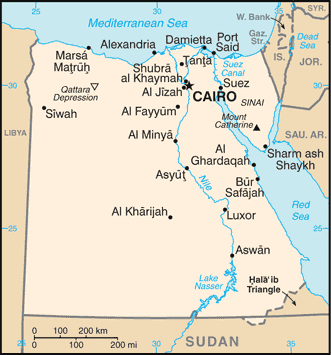
The terrain of Egypt is dominated by a vast desert plateau as well as the Nile valley and delta .The regularity and richness of the annual Nile River flood, coupled with semi-isolation provided by deserts to the east and west, allowed for the development of one of the world's great civilizations.
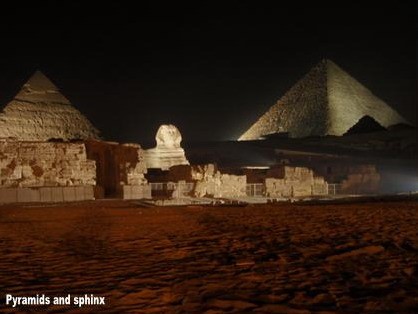
Climate is mostly desert with hot and dry summers and moderate winters. Egypt’s land boundaries are 2,689 kilometers while it has 2,450 kilometers of coastline. Area: 1,001,450 sq km, of which 995,450 sq km is land and 6,000 sq km is water. Population is about 80 million, of which 98% are Egyptian while the rest are comprised of Berber, Nubian, Bedouin, Beja, Greek, Armenian, Italian and French. Capital is Cairo. Other cities are Alexandria, Giza, Shubra el Khema and El Mahalla el Kubra. The official language is Arabic. English and French are also spoken.
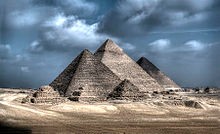
The Giza Necropolis is the oldest of the ancient Wonders and the only one still in existence
A unified kingdom arose circa 3200 B.C., and a series of dynasties ruled in Egypt for the next three millennia. The last native dynasty fell to the Persians in 341 B.C., who in turn were replaced by the Greeks, Romans, and Byzantines. It was the Arabs who introduced Islam and the Arabic language in the 7th century and who ruled for the next six centuries. A local military caste, the Mamluks took control about 1250 and continued to govern after the conquest of Egypt by the Ottoman Turks in 1517. Completion of the Suez Canal in 1869 elevated Egypt as an important world transportation hub. Ostensibly to protect its investments, Britain seized control of Egypt's government in 1882, but nominal allegiance to the Ottoman Empire continued until 1914. Partially independent from the UK in 1922, Egypt acquired full sovereignty from Britain in 1952. The completion of the Aswan High Dam in 1971 and the resultant Lake Nasser have altered the time-honored place of the Nile River in the agriculture and ecology of Egypt. A rapidly growing population (the largest in the Arab world), limited arable land, and dependence on the Nile all continue to overtax resources and stress society.
Islam came to Egypt in the seventh centuries with the arrival of the Arabs. According to the Constitution of 1971, the official state religion is Islam and the majority of Egypt's population are Muslims. Egypt is a predominantly Sunni Muslim country with Islam as its state religion. The percentage of adherents of various religions is a controversial topic in Egypt. An estimated 90% are identified as Muslim, 9% as Coptic Christians, and 1% as other Christian denominations.
After Islam arrived in the 7th century, Egypt emerged as a center of politics and culture in the Muslim world. Under Anwar Sadat, Islam became the official state religion and Sharia the main source of law. It is estimated that 15 million Egyptians follow Native Sufi orders, with the Sufi leadership asserting that the numbers are much greater as many Egyptian Sufis are not officially registered with a Sufi order. There is also a minority of Shi'a. The Jerusalem Center for Public Affairs estimates the Shia population at 1 to 2.2 million and could measure as much as 3 million. The Ahmadiyya population is estimated at less than 50 thousand. Whereas the Salafi (ultra-conservative) population is estimated at five to six million. Cairo is famous for its numerous mosque minarets and has been dubbed "The City of 1,000 Minarets".
Egypt recognizes only three religions: Islam, Christianity, and Judaism. Other faiths and minority Muslim sects practiced by Egyptians are not recognized by the state, and face persecution.
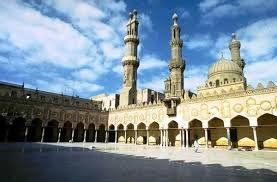
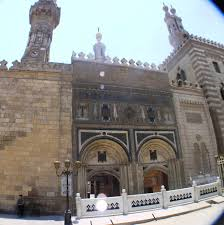
Al-Azhar University
There are two main Islamic institutions in Egypt, the oldest and the most important Islamic institutions represented in:
- Al-Azhar, which was built by the Fatimids to spread the Shiite sect in North Africa, before Salah El-Din converts it to Sunni University to become one of the main pillars of Sunni Islam in the world. And the current Sheikh of Al-Azhar is Eminance Sheikh Ahmed al-Tayeb.
- Dar el Eftaa was founded in 1895 and headed by the Grand Mufti of Egypt, Eminence Sheikh Ali Gomaa holds the post now.
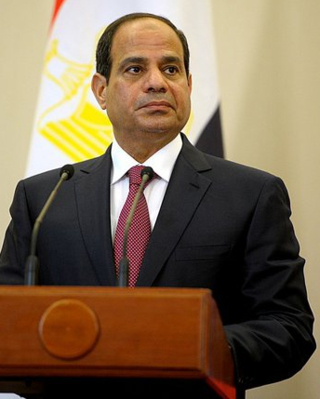
Abdel Fattah el-Sisi, current President of Egypt
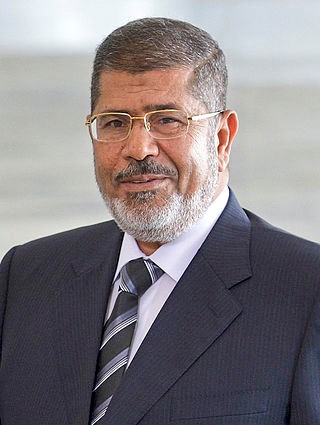
Mohamed Morsi
The government has struggled to meet the demands of Egypt's population through economic reform and massive investment in communications and physical infrastructure. Inspired by the 2010 Tunisian revolution, Egyptian opposition groups led demonstrations and labor strikes countrywide, culminating in President Hosni MUBARAK's ouster. Egypt's military assumed national leadership until a new parliament was in place in early 2012; later that same year, Mohammed MORSI won the presidential election. Following often violent protests throughout the spring of 2013 against MORSI's government and the Muslim Brotherhood (MB), and massive anti-government demonstrations, the Egyptian Armed Forces (EAF) intervened and removed MORSI from power in mid-July 2013 and replaced him with interim president Adly MANSOUR. On 18 January 2014, the interim government instituted a new constitution following a referendum in which 98.1% of voters were supportive. Participation was low with only 38.6% of registered voters participating although this was higher than the 33% who voted in a referendum during Morsi's tenure. On 26 March 2014 Abdel Fattah el-Sisi the head of the Egyptian Armed Forces, who at this time was in control of the country, resigned from the military, announcing he would stand as a candidate in the 2014 presidential election. The poll, held between 26 and 28 May 2014, resulted in a landslide victory for el-Sisi. Sisi sworn into office as President of Egypt on 8 June 2014. The Muslim Brotherhood and some liberal and secular activist groups boycotted the vote.

Cairo
Major exports are machinery and equipment, foodstuffs, chemicals and wood products. Natural resources are petroleum, natural gas, iron ore, phosphates, manganese, limestone, gypsum, talc, asbestos, lead and zinc. Agricultural products are cotton, rice, corn, wheat, beans, fruits, vegetables, cattle, water buffalo, sheep and goats. Major trading partners are Italy, United States, Syria, Germany, Spain, France, China, United Kingdom and Saudi Arabia.
Egypt's economy was highly centralized during the rule of former President Gamal Abdel NASSER but opened up considerably under former Presidents Anwar EL-SADAT and Mohamed Hosni MUBARAK. Cairo from 2004 to 2008 aggressively pursued economic reforms to attract foreign investment and facilitate growth. Poor living conditions combined with limited job opportunities for the average Egyptian contribute to public discontent. After unrest erupted in January 2011, the Egyptian Government backtracked on economic reforms, drastically increasing social spending to address public dissatisfaction, but political uncertainty at the same time caused economic growth to slow significantly, reducing the government's revenues. Tourism, manufacturing, and construction were among the hardest hit sectors of the Egyptian economy, pushing up unemployment levels, and economic growth remains slow amid political uncertainty, government transitions, unrest, and cycles of violence. Cairo since 2011 has drawn down foreign exchange reserves and depended on foreign assistance, particularly from Gulf countries, to finance imports and energy products and prevent further devaluation of the Egyptian pound, fearing higher inflation from a weaker currency.
